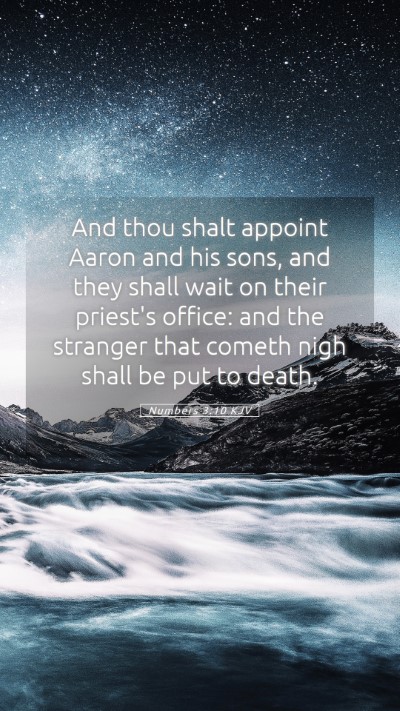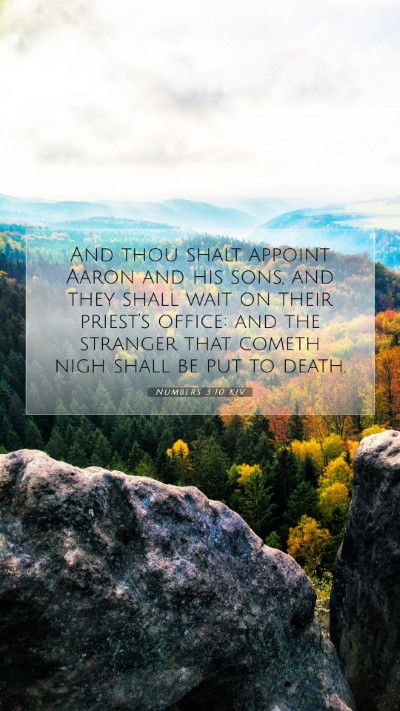Explanation of Numbers 3:10
Understanding Scripture: Numbers 3:10 states, "And you shall appoint Aaron and his sons, and they shall attend to their priesthood; but the outsider who comes near shall be put to death." This verse encapsulates the divine order established by God regarding the role of the priesthood within the Israelite community, signifying the importance of holiness and separation from the common people.
Bible Verse Commentary
This verse is critical for several reasons, each explored through the lenses of Matthew Henry, Albert Barnes, and Adam Clarke:
- Divine Appointment: Both Henry and Clarke emphasize that Aaron and his sons were specifically chosen by God for the priesthood, highlighting the sacredness of their role. This selection underscores God's sovereignty and the unique purpose assigned to the tribe of Levi, particularly the descendants of Aaron.
- Holiness and Separation: The demand for separation from outsiders is a theme carried through the Old Testament, as noted by Barnes. It reflects the idea that those who approach God must do so with the understanding of their own need for holiness and purity, which is a recurrent motif in Bible study.
- Consequences of Approach: The stern warning that an outsider who approaches the sanctuary must face death indicates the seriousness of approaching God's presence improperly. Henry points out that this serves as a lesson in reverence and the need for the proper mediators between God and man, foreshadowing the ultimate mediation through Christ.
- Typology of Christ: Adam Clarke elaborates on the typological significance of the priesthood, suggesting that Aaron’s appointed role symbolizes Christ’s once-for-all priesthood, representing the fulfillment of Old Testament law in the New Testament.
In-depth Bible Verse Analysis
The contextual background of this passage is vital for full understanding. The Levites were set apart for specific tasks related to the tabernacle and worship, reflecting God's design for communal worship and leadership. This structure indicates how God desires order in His church, an insight relevant not only historically but also to contemporary Bible study groups.
Historical Context of Bible Verses
The Book of Numbers documents the Israelites’ journey through the wilderness, with Chapter 3 providing instructions regarding the roles of the Levites after the Exodus. Understanding this historical context allows readers to appreciate the weight of God’s law and the seriousness with which He treated worship.
Application of Numbers 3:10 to Daily Life
For modern readers, this verse encourages a reflection on the holiness of God and the importance of approaching Him with the reverence He deserves. In the context of Christian worship today, it suggests that leaders and believers alike must uphold holiness in their approach to God.
Bible Study Insights
When studying this verse, it is helpful for Bible study lessons to focus on:
- The implications of cultural and spiritual separation today.
- The necessity of recognizing God’s holiness in worship settings.
- How Christ fulfills the Old Testament priesthood.
Cross References
This verse is connected to several other biblical passages that reinforce its meaning:
- Exodus 29:9: "And you shall gird them with sashes, Aaron and his sons, and put the hats on them. The priesthood shall be theirs for a perpetual statute." - Highlights the continuity of the priestly role.
- Leviticus 10:1-2: "Nadab and Abihu, the sons of Aaron, each took his censer and put fire in it and laid incense on it, and offered unauthorized fire before the Lord, which He had not commanded them." - Demonstrates the seriousness of approaching God without His instructions.
- Hebrews 7:23-28: "The former priests were many in number, because they were prevented by death from continuing in office; but he holds his priesthood permanently, because he continues forever." - Discusses the lasting priesthood of Jesus Christ.
Conclusion: Numbers 3:10 serves as an essential reminder of God's order, holiness, and the significance of properly approaching Him through appointed mediators. This verse is not only a historical account but also offers profound bible verse interpretations that can transform worship and understanding of God's character.


